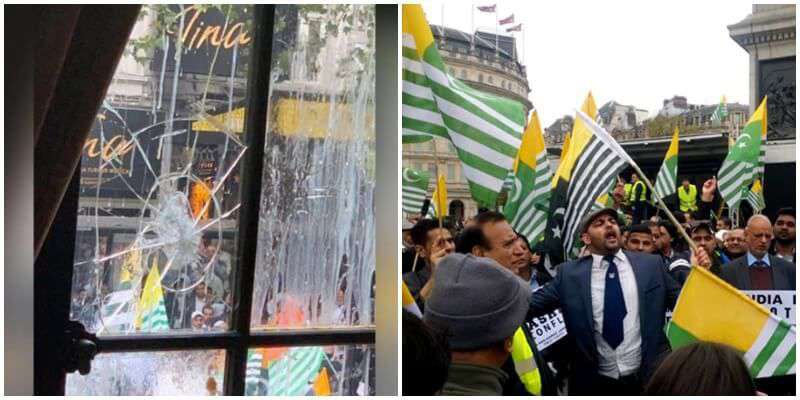England Murdabad Murdabad Scotland Ko Azad Karo Azad Karo

Protest against the abrogation of Article 370 outside the Indian High Commission in London
Britain lecturing India on respecting human rights shows the former’s disrespect for India’s democracy. These Brits after looting nearly the entire world and killing millions, are trying to lecture India. We need to ignore there barking and not even waste a shut up call to them.
India should also provide all possible support to Scotland and Norther Ireland in their fight for independence. Both the Queen of England and the PM need to be encouraged to vacate both Scotland and Northern Ireland at the earliest. This will be the most sensible step ever taken by the Brits in their history.
Below is an article written on the issue
by Kanwal Sibal
Britain’s conduct with regard to developments in Jammu and Kashmir is unacceptable. It played a dubious role in the United Nations Security Council’s (UNSC) closed-door meeting on Kashmir. It was prepared to support a press statement by the UNSC based on a consensus, which did not emerge (China and Pakistan would have wanted it).
Janus-Faced Britain
When articles deploring Britain’s wiles in the UNSC were criticised in the Indian press, British diplomats were indignant that an unwarranted campaign was being encouraged to target Britain when, in fact, they had been helpful in ensuring only a closed-door discussion with no formal statement. Subsequent actions of the British authorities actually confirm their bad faith. They have permitted two well-organised demonstrations by British Pakistanis and Khalistanis in front of our High Commission on our Independence Day and on September 3.
When Prime Minister Narendra Modi raised the Independence Day protest with UK PM Boris Johnson, he expressed regrets. After this highest-level demarche, we could have expected the British to respect our legitimate concerns about the security and functioning of our High Commission and prevent hostile elements in the UK to again target our diplomatic premises. Surprisingly, the British authorities permitted an even larger protest against the High Commission, this time by 10,000 local Pakistanis and Khalistanis. All this in the name of “peaceful protests”. For Britain, damaging windows and defacing the walls of our diplomatic premises is apparently “peaceful” and legal under Article 22 of the Vienna Convention.
The British are fully aware of Pakistan PM Imran Khan’s declared plan to launch an intensive international campaign against India’s step to nullify Article 370, which includes mobilising Pakistani communities abroad to stage abusive and hate-filled demonstrations against India. They know that by permitting such large-scale demonstrations in London, they further the belligerent agenda of Pakistan. India’s decision on Article 370 is not a quarrel between India and Britain, and should not become one.
Britain’s foreign secretary, Dominic Raab, has made a totally unacceptable statement in Parliament on the Kashmir issue, reflecting an enduring imperial hangover. Lecturing India on respecting internationally recognised human rights shows disrespect for India’s democracy.
Raab has disregarded India’s compulsions to take preventive steps to protect the lives of innocent Kashmiris from Pakistan-sponsored Jihadis who have caused terrible mayhem in Kashmir for three decades now. The restrictions imposed by India prevent violence, not inflict it. With the Internet and social media, terrorists can promote violence through rapid mobilisation, exhortation and fake news.
The British themselves are grappling with this new tool of radicalisation and instigating violence. Why does Raab think that India, with a much graver ground situation than what Britain faces, should not have these concerns?
Human Rights Bogey
Raab sermonises, “The issue of human rights is not just a bilateral issue for India and Pakistan or a domestic issue, but an international issue.” We have never claimed or accepted that the human rights issue is a bilateral one between us and Pakistan. We have all the domestic instruments of a functioning democracy to deal with human rights issues, and do not accept international interference.
Unlike Britain, and other Western countries, we have no historical baggage with regard to barbaric violations of human rights through external conquests, colonialism, racial discrimination, slavery and genocide of indigenous populations. Currently, Britain has participated in the destruction of Iraq, Libya and Syria, inflicting untold miseries on local populations. It should be careful in taking the moral high ground on human rights issues with India. Worse, Raab has insidiously introduced UNSC resolutions on the Kashmir issue in his statement by claiming that “as recognised in UN Security Council resolutions and the Simla Agreement”, India and Pakistan have to fundamentally resolve the Kashmir “dispute”, forgetting that the UNSC resolutions were structured around UN mediation; that even as late as 1961, Britain formally intervened in the Kashmir issue along with the US, and that the Simla Agreement excludes UN or any third-party role.
Partisan For Pakistan?
How does Raab mention the UNSC resolutions and the Simla Agreement in the same sentence, when they are contradictory? His unwarranted reference to the UNSC resolutions only confirms its mischievous role in the UNSC closed-door meeting. Britain seems ready to internationalise the Kashmir issue, as Pakistan wants, when it says that while Britain wants to respect India’s constitutional arrangements in Kashmir, they do “have implications internationally as they touch on internationally respected and recognised human rights”. This boosts Pakistan’s plans to raise this issue in the Human Rights Council.
The US-UK tandem, historically problematic for us over Kashmir, is active again. Despite our highly improved ties, the US persists in interfering in our internal affairs in Kashmir and berates us on human rights issues, ignoring that this erodes trust-building. The US State Department’s latest statement goes so far as prescribing the steps the Indian government should take in Kashmir.
It is urging us “to respect human rights and restore access to services such as the internet and mobile networks” and is asking for “resumption of political engagement with local leaders and the scheduling of promised elections at the earliest opportunity”. One thought we governed Kashmir, not Washington. The muted reaction of the government to UK/US provocations is not helpful, as it opens us to more pressure.



